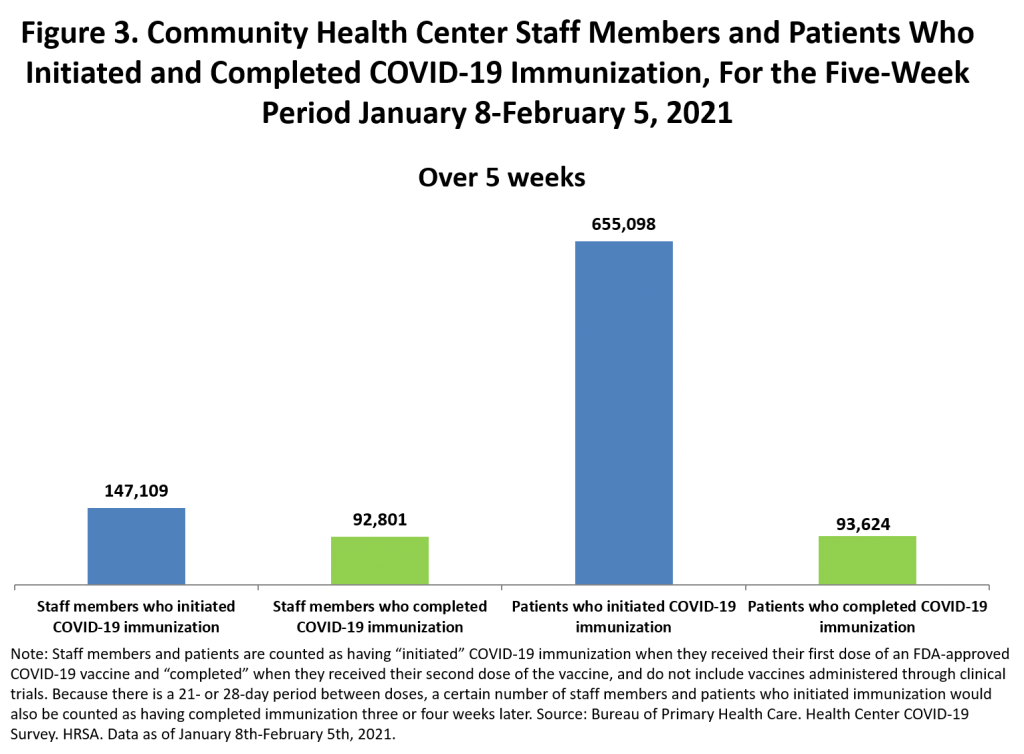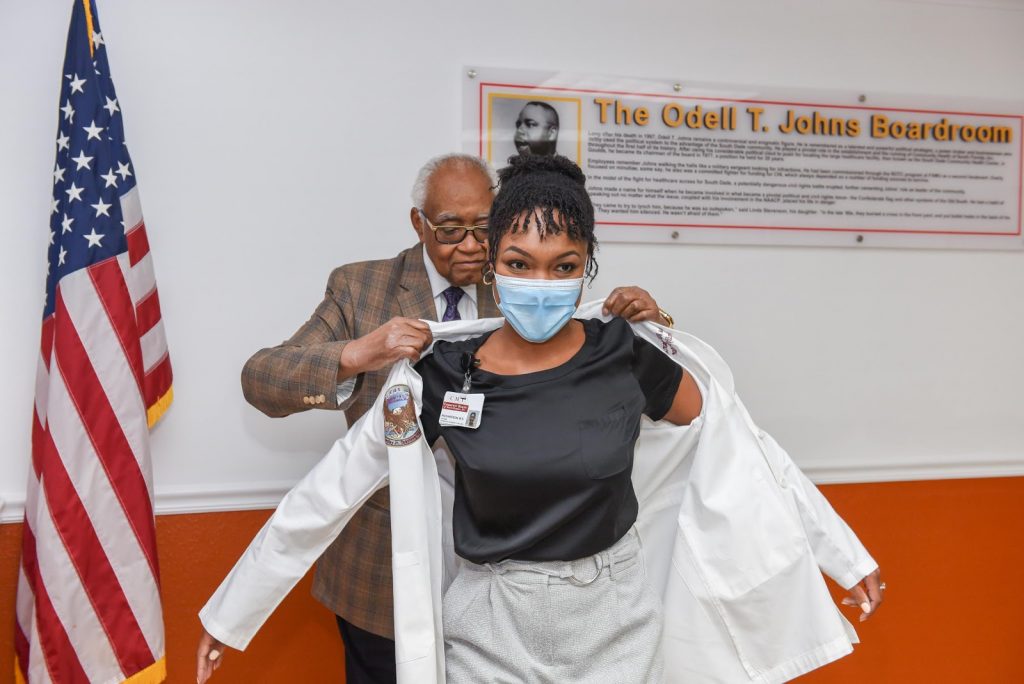Health Center COVID-19 Vaccine Program Launches
Community health centers’ role in COVID-19 immunization is expected to increase substantially under the new White House Health Center COVID-19 Vaccination Program, announced February 9th, to speed up immunizations in the most severely underserved communities. The program is ramping up as part of the Administration’s broader national effort to ensure equitable access to vaccines while also empowering trusted, community-based health care providers with a strong track record of immunizing patients at serious risk for health disparities.
Our latest data note describes the Biden Administration’s initiative and presents current information on the number of community health center staff members and patients who have received COVID-19 vaccine doses, using data from the latest published Health Resources and Services Administration’s Health Center COVID-19 Survey.
For the 5-week period from January 8th to February 5th, 2021, 147,109 staff members initiated immunizations and 92,801 completed their COVID-19 vaccine series, the latter accounting for more than one in three (37 percent) of all health center staff members. Over that same period 655,098 health center patients received their first dose and 93,624, their second dose of COVID-19 vaccine from any source, underscoring the vital importance of a rapid ramp-up of this initiative to get vaccines where they’re most needed.
The data note was produced by the Geiger Gibson/RCHN Community Health Foundation Research Collaborative at Milken Institute SPH.
Read the date note, “Community Health Centers Move to Frontline Providers of COVID-19 Immunization Services Under President Biden’s Health Center COVID-19 Vaccine Program”
View our COVID-19 Data Note series

__________________________________________________________________________________________________________________________
CHCANYS’ Recommendations for Continuing and Expanding Remote Care Post-Pandemic
The Community Health Care Association of New York State (CHCANYS) has released its key recommendations for post-pandemic telehealth. The recommendations follow a well-received paper issued last June by the Association and the New York State Council for Community Behavioral Healthcare (NYS Council) titled, Ensuring Sustained Access to Telehealth in the Post-Pandemic Period which outlines key principles for consideration by New York State to improve remote care delivery and reimbursement.
Supported by a grant from the RCHN Community Health Foundation, CHCANYS worked with researchers at New York University Grossman School of Medicine to conduct qualitative interviews with patients and providers at eight New York State community health centers to better understand patient and provider perspectives regarding remote care and their corresponding implications for care delivery once the pandemic ends.
Read CHCANYS press release and the full report Ensuring Sustained Access to Telehelath Post-Pandemic: Patient and Provider Attitudes and Beliefs Support Use of Remote Care.
__________________________________________________________________________________________________________________________
ACCESS – Integrated Health Home Journey
A white paper was recently released by our colleagues at Access Community Health Network (Chicago, IL). In 2017, ACCESS embarked on a journey to pilot an Integrated Health Home (IHH) model within its system of 35 health centers, collaborating with partners Catholic Charities, Gateway Foundation, Sinai Health System, and Trilogy Behavioral Healthcare. The IHH seeks to overcome the challenges of a fragmented service delivery system. It addresses the needs of individuals with complex social, behavioral and medical needs through full integration and sharing of information and care between and across providers and a suite of supportive social services. The Integrated Health Home Journey describes this model, discusses how the model functioned and presents key learnings and recommendations. The goal of the IHH Steering Committee, which authored the paper, is to share best practices and challenges for those who seek to implement a similar model. RCHN Community Health Foundation was among the funders that supported the planning, implementation and evaluation of the innovative IHH pilot.
__________________________________________________________________________________________________________________________
Bobby Watts Appointed to Biden-Harris COVID-19 Equity Task Force
On February 10, 2021, President Biden and Vice President Harris appointed Bobby Watts, CEO of National Health Care for the Homeless Council, and an esteemed member of the Foundation’s Board of Directors, to the Biden-Harris COVID-19 Health Equity Task Force.
Chaired by Dr. Marcella Nunez-Smith of Yale University, the Task Force includes 12 individual members as well as representatives of the Department of Agriculture, Department of Education, Department of Health and Human Services, Department of Housing and Urban Development, Department of Justice, and Department of Labor. It is charged with identifying inequities caused and exacerbated by the COVID-19 pandemic and issuing recommendations to ensure equitable resource allocation in future pandemic response. Bobby’s clear and important voice is sure to inform and enrich the work of the Equity Task Force.
__________________________________________________________________________________________________________________________
Medicaid Work Requirements
A new blog for Health Affairs by colleagues Erin Brantley, Leighton Ku, Sara Rosenbaum, Morgan Handley and Rebecca Morris from the Department of Health Policy and Administration, Milken Institute School of Public examines Medicaid Work Requirements: As The Biden Administration Begins Unwinding Them, Medicaid Work Experiments Remain Unreasonable, Unnecessary, And Harmful.
__________________________________________________________________________________________________________________________
Community Health Centers in the News
Community health centers continue their work on the front lines to provide COVID-19 testing and vaccinations to the hardest-hit populations. In New York, health centers are advocating to include agricultural workers among eligible frontline workers prioritized for the COVID-19 vaccine. Anne Kauffman Nolon, CEO of Sun River Health, was interviewed for this article on the urgency of reaching vulnerable farmworkers: Essential, Invisible, Ineligible: Food and Farm Workers Wait for Vaccine.
__________________________________________________________________________________________________________________________
CHroniCles Spotlight
The Brodes Hartley Jr. Teaching Health Center is a signature program of Community Health of South Florida, Inc. (CHI) and the first teaching health center in the state of Florida. Here’s Colonel Hartley, CEO of CHI, at a recent event.




